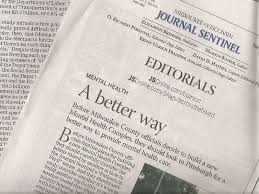The purpose of the GRE’s Analytical Writing section is to test your critical thinking & analytical writing skills. These skills include your ability to properly...
The Formula for a Great GRE Essay
 When's the last time you read the editorial section of a newspaper? In case you haven't picked one up in awhile, that's the section in which the editors, speaking for the newspaper as a whole, express the paper's stance on pertinent issues of the day. Strong editorials don't have to be particularly long, but they clearly articulate the point of view of the editorial board, offer strong support for why the editors feel the way they do, address and refute counterarguments, and wrap up with a strong reiteration of the main argument, sometimes with a call to action. The best editorials capture the passion and conviction of the writers—in a manner such that those who already agree will be galvanized, and those who disagree may in some cases be persuaded to rethink their point of view. These skills, it just so happens, encapsulate the kind of writing that can knock a GRE essay out of the park.
When's the last time you read the editorial section of a newspaper? In case you haven't picked one up in awhile, that's the section in which the editors, speaking for the newspaper as a whole, express the paper's stance on pertinent issues of the day. Strong editorials don't have to be particularly long, but they clearly articulate the point of view of the editorial board, offer strong support for why the editors feel the way they do, address and refute counterarguments, and wrap up with a strong reiteration of the main argument, sometimes with a call to action. The best editorials capture the passion and conviction of the writers—in a manner such that those who already agree will be galvanized, and those who disagree may in some cases be persuaded to rethink their point of view. These skills, it just so happens, encapsulate the kind of writing that can knock a GRE essay out of the park.
“What?” you may be wondering. “How can a boring, formulaic 5-paragraph essay like the ones we need to write for the GRE have anything to do with impassioned, free-form writing like a newspaper editorial or opinion?”
Everything. See, the GRE essay is nothing more than a setup. You're given a point of view to expound on. Let's take an example from ETS:
“Some people believe that corporations have a responsibility to promote the well-being of the societies and environments in which they operate.Others believe that the only responsibility of corporations, provided they operate within the law, is to make as much money as possible.Write a response in which you discuss which view more closely aligns with your own position and explain your reasoning for the position you take. In developing and supporting your position, you should address both of the views presented.”
You can write a solid GRE essay with any of three approaches: 1) Argue strongly for a socially conscious corporate philosophy; 2) Argue strongly for a revenue-oriented corporate philosophy; or 3) Argue strongly for a middle ground – that corporations are well within their legal and ethical rights to generate as much profit as they can, provided they do so in a socially and/or environmentally conscious way. (take care that if you go with Option 3, that you are very clear in the opening paragraph that the middle ground is your point of view, and that you're not just tossing out ideas)
Note that I advised you to “Argue strongly” in each example?
That's where the editorial approach comes into play. Whatever you're writing about, no matter how mundane the topic, try to work yourself up a bit. Try to become impassioned. Try to think about aspects of each point of view that might make you angry, or excited, or forceful. Does the idea of businesses acting against the interests of their communities infuriate you? Then perhaps you'll go with option 1. On the other hand, perhaps you know people whose businesses have been hampered by government interference and that bothers you—if so, option 2 might be the way to go. Otherwise, maybe you're impassioned about the need for a nuanced, balanced approach to these hot button issues, and you want to convey that. Option 3 is probably the way to go in that case. (take a look at some ideas for expressing opinions here). Moreover, with the GRE increasingly accepted in place of or alongside the LSAT for law school applicants, the importance of solid, analytical opinion writing becomes even clearer. See this article from USNews for advice on choosing which exam to take as a prospective law student.
Remember, though, in all 3 cases, you're still ‘Analyzing an Issue’, and you'll always need to consider counterarguments. But the best editorials are still deeply analytical, even in their forcefulness and passion. This is what you should strive to do in the GRE essay—to get the reader as involved in reading your essay as you were in writing it. But don't take my word for it—pick up a newspaper tomorrow morning, and read theditorial (or op-ed) section, and see for yourself. It's excellent practice for the GRE.
